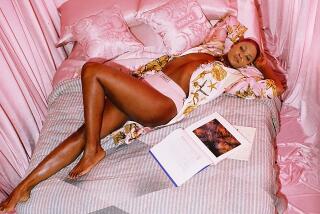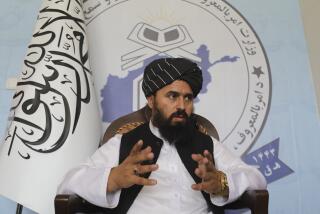Clothing Choice Covers a Multitude of Symbols
- Share via
Re “An Identity Reduced to a Burka,” Opinion, Jan. 20: Of course, no woman should be forced to burn her burka or cast aside the hijab in order to advance. But Islam, more than any of the other great (read patriarchal) world religions, is obsessed with assuaging primitive male fears and spinning out medieval male fantasies. That doesn’t leave much room to embody the highest human aspirations.
The religion hasn’t been permitted to evolve by the men who interpret it. They’ve decided that their women (and 14-year-old girls) must bear responsibility for the lack of masculine self-control. This isn’t God talking about veiling but the guys who fancy themselves his proxies.
Deborah W. Elliott
Pacific Palisades
*
Laila Al-Marayati and Semeen Issa could not have better encapsulated the voice of Muslim women everywhere.
As a young Muslim American woman, born and raised in the Southland, I chose to begin wearing the hijab (head scarf) at 13 to assert my individuality and devotion to God. I dress this way to please my creator, but I also strive to please him by dealing justly with people, pursuing my career and simply having a smile on my face. While the hijab represents these assertions, it is not the end-all of my being.
Thank you on behalf of all Muslim women for setting the record straight.
Sakeena Mirza
Palos Verdes Estates
*
In their zeal to represent Muslim culture as an equal opportunity employer, Al-Marayati and Issa assert that Muslim women, “like women everywhere,” will seek education and positive contributions to their societies and that “how they dress is irrelevant.”
I beg to differ. Have you ever tried to do surgery in a burka? Pilot a plane? Play golf or tennis? Being beaten for publicly exposing your feet or hands hardly enables you to pursue higher learning.
If Muslim women are not outraged by a regime that forces them to wear such a contraption, then what tree is the U.S. barking up? If a Muslim woman chooses to wear a burka, that is her business. But aren’t we fighting for that key word, “choose”?
Karen McCarthy
Claremont
*
It is so true that women’s dress seems so important and that we sometimes forget to reflect on what is truly more important, the individual’s spirit and behavior. The hijab is really not a new concept in religion. This expression of modesty has also been a part of Christianity, in the habit worn by nuns, and of Judaism, where Orthodox married women wear head scarves.
But it is not only dress that contributes to being modest, it is one’s behavior and attitude. These women who choose to wear the head covering because of their belief and level of God-consciousness should be commended for daring to be different and for standing out among a society where “physical beauty” is overemphasized.
Burka, hijab, habit, head scarf: May we recognize these symbols for what they are, as symbols of faith and free choice that women must make on their own and society must respect.
Lena Al-Sarraf
Santa Clarita
*
I fear Al-Marayati and Issa may have misunderstood the feminists who are faulted for their overzealous photographing of women in burkas to draw attention to the oppression of Afghan women. The feminists are not solely focused on the burkas, nor is any feminist suggesting that a woman should not be given the freedom to proudly wear a burka if she so chooses. However, if there is one Afghan woman who, because of her gender, is forbidden from learning to read, to educate her daughters or to dress as she chooses, then further change is needed. The burka was not chosen as a symbol because of an obsession with clothing but more likely because it is easier to photograph than illiteracy and oppression.
Kim Elsesser
Pasadena






